SubjunctiveMood (虚拟语气)
语法大全:虚拟语气精品资料(Subjunctive Mood)

含蓄虚拟条件句
分词短语或不定式短语也可引导暗含虚拟条件句。 例句:You would have laughed to see him jump aside. 你要是看到他跳到一边的样子一定会大笑。
暗含虚拟条件的简单句中,虚拟语气可通过上下文表现出 来。 例句:You shouldn't have been following him so closely; you should have kept your distance. 你本不该跟他这么紧,你本该保持一定距离的。
例句3:
Had he worked harder, he would have got through the exam. = If he had worked harder...
只有were/should/had三种情况。
含蓄虚拟条件句
有时虚拟语气还可以用but for, without, under, with, in the absence of等介词短语和连词but, or, but that 以及otherwise等形式引导。 例句1: Under such circumstances, I would probably have done the same. 在这样的情况下,我也可能做出同样的事情。 例句2: But that he came to help me, I couldn't have succeeded. 要不是他来帮我,我就不可能成功。
宾语从句中的虚拟语气
注意: 当suggest, insist等动词不表示建议、要求等意思时,其 宾语从句中的谓语动词不需要使用虚拟语气。
例如:
1:Are you suggesting that I am not suited for the job? 你是在暗示说我不适合那工作吗? 2:He insisted that he was innocent. 他坚称自己是无辜的。
subject mood

虚拟语气(subjunctive mood)一:定义虚拟语气是一种动词形式,表示说话人的一种愿望,假设,怀疑,猜测,建议等含义,虚拟语气所表示的含义不是客观存在的事实。
If I were you, I'd take them away. 如果我是你的话,我就会带走他们。
If I had met Li Hua, I could had told him. 如果我碰见了李华,我就告诉了他了。
If I had time. I could come to help you. 如果我有时间,我会来帮助你的。
He suggested that our class should be divided into five groups. 他建议说我们的班应该分成五个小组。
He speaks to us as if he had been there. 他给我们讲的好象他去过那儿。
二:用法(一)虚拟语气用在简单句中,表示祝愿,命令。
1. 说话时,为了表示客气、谦虚、委婉而有礼貌,言语常使用虚拟语气。
其虚拟语气的结构形式常为:would / could / might / should + 原形动词。
如:Would you mind my shutting the door? 我把门关起来你介意吗?You should always learn this lesson by heart. 你要把这个教训牢记于心。
I should agree with you. 我应该同意你的观点。
2. 表示“祝愿”时,常用“may + 主语+ 动词原形+ 其他”。
如:May you have a good journey! 祝你一路顺风。
May your youth last for ever! 祝你青春永驻。
3. 表示强烈的“愿望”、“祝愿”时,常用动词原形。
如:Long live the Communist Party of China. 中国共产党万岁。
Subjunctive Mood虚拟语气

Subjunctive Mood 虚拟语气(一)-- Used in “if” clause语气(Mood)分三种:直陈语气,祈使语气和虚拟语气.虚拟语气是一种特殊的动词形式,用来表示说话人所说的话并不是事实,而是一种愿望,假设,怀疑,猜测,建议。
“if” 引导的条件句有真实条件句与非真实条件句两种。
1. 真实条件句所表示的假设1) 不随时间而改变的自然法则和客观真理2) 可能发生或实现的:if后面的从句用一般现在时,主句用祈使语气或情态动词.2. 非真实条件句所表示的假设是不可能发生或不大可能实现的:时态共分两种情况。
If引导的从句主句A.与现在事实相反 If+主语+动词过去式(be的过去式一律用were)主语+would+动词原形B.与将来事实相反 If+主语+动词过去式(be的过去式一律用were)主语+would+动词原形C.与过去事实相反 If +主语+ had+动词过去分词主语+would+have+过去分词Exercises:1. 与现在或将来相反If you … you would …were Chairman Huwere Bushcould choose a place for your housewon a lottery of 5 millionyour child were addicted to computer gamescame across a blackout in a lift2. 与过去相反Write conditionals based on the following facts.1) She didn’t take t he medicine, so she felt carsick.2) Because the sun was in the right direction, the photos came out verywell.3) The shop didn’t pack the goods properly, so they got damaged.4) The government raised taxes, so they were very unpopular.5) He wasn’t able to answer all the questions, so he didn’t pass theexamination.6) He didn’t pass the examination, so he didn’t go to the university.7) We didn’t get there on time, so we found the doors locked in our faces.8) She didn’t see Curse of the Golden Flower, so she didn’t understandwhat I said.3. Multiple choices1. What will we do if it _____ tomorrow?A. snowB. would snowC. snowsD. will snow2. You _____ such a serious mistake if you had followed his advice.A. may not makeB. might not makeC. wouldn’t have madeD. might have made3. _____ to see the doctor right away, he might have been alive.A. If he wentB. If he goneC. If he has goneD. If he had gone4. If you were older, I _____ you to go there yesterday.A. will allowB. should allowC. would have allowedD. had allowed5. If we _____ here ten minutes earlier, we _____ the bus.A. arrived/would catchB. arrived/would have caughtC. had arrived/had caughtD. had arrived/would have caught6. If I _____ more time, I would have gone with him.A. hadB. had hadC. have hadD. would have7. Don't touch the sleeping tiger. If he woke up, he _____ you.A. would comeB. would come atC. would have comeD. will come at8. If it _____ tomorrow, what would we do?A. rainsB. were to rainC. would rainD. rain9. If he _____ to the teacher attentively, he _____ the answer to theproblem.A. had listened, would have knownB. listened, would knowC. listened, would have knownD. had listened, would know10. ---- I thought you would come back tomorrow.---- I would if I _____ to attend a meeting.A. don’t haveB. didn’t haveC. will not haveD. would not have11. If I had hurried, I _____ the train.A. would catchB. could catchC. would have caughtD. had caught12. If I had known that, I _____ so.A. wouldn’t doB. wouldn’t have doneC. won’t doD. have not done13. If I _____ you, I wouldn’t call back.A. beB. amC. wasD. were14. If the doctor had been available, the child _____.A. would not dieB. would not have diedC. could not dieD. could die15. You are late. If you _____ a few minutes earlier, you _____ him.A. came/ would meetB. had come/ would have metC. come/ will meetD. had come/ would met16. If you had told me in advance, I _____ him at the airport.A. would meetB. would had meetC. would have metD. would have meet17. If it _____ another ten minutes, the game would have been cancelled.A. had rainedB. would had rainedC. have seenD. did see18. You _____ the train if you _____ a little earlier.A. could take/ startedB. would have taken/ had startedC. could take/ had startedD. would have took / started19. The Bakers arrived last night, if they’d only let us know earlier,_____ at the station.A. we’d meet themB. we’ll meet themC. we’d have met themD. we’ve met them20. If I _____ you, I _____ more attention to English idioms and phrases.A. was/ shall payB. am/ will payC. would be/ would payD. were/ would pay21. We might have failed if you _____ us a helping hand.A. have not givenB. would not giveC. had not givenD. did not give22. If I _____ the money, I would have bought a much bigger car.A. possessedB. ownedC. hadD. had had23. If her husband had not liked the dress _____.A.she would be delightedB. he would get madC. she would have returned itD. she would take it back to the store24. If I _____ you, I _____ worry.A. were/ wouldn’tB. was/ wouldn’tC. been/ would haveD. be/ would25. We _____ delighted if the report _____ true.A. were/ wereB. will be/ wereC. may be/ wereD. were/ would beKeys:CCDCD/BBBAB/CBDBB/CABCD/CDCABSubjunctive Mood 虚拟语气(二)1. 一些要求用“过去式或过去完成式”来表示虚拟的固定句式. 过去式表示与现在事实相反;过去完成式表示与过去事实相反.它们有:(1)wish + 从句(2)主 + would rather + sb + V .(3)It’s ( high ) time that …(只用过去时)(4)If only +从句2.用(should )+(原形)来表示虚拟的情况虚拟语气在动词suggest, desire, require, command, propose, order, insist, request, 等表示“请求,建议,命令,要求”后面的宾语从句中用“should +动词原形”, should可以省略。
Subjunctive Mood 虚拟语气
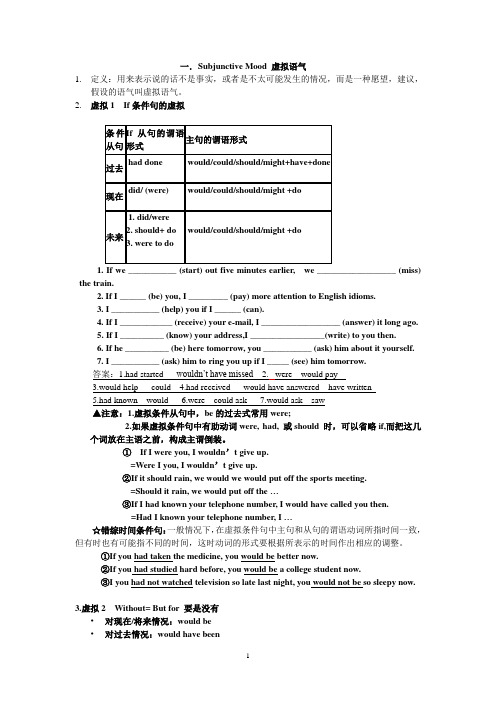
一.S ubjunctive Mood 虚拟语气1.定义:用来表示说的话不是事实,或者是不太可能发生的情况,而是一种愿望,建议,假设的语气叫虚拟语气。
2.虚拟1 If条件句的虚拟1. If we ___________ (start) out five minutes earlier, we __________________ (miss) the train.2. If I ______ (be) you, I _________ (pay) more attention to English idioms.3. I ___________ (help) you if I ______ (can).4. If I ____________ (receive) your e-mail, I __________________ (answer) it long ago.5. If I __________ (know) your address,I _________________(write) to you then.6. If he __________ (be) here tomorrow, you ___________ (ask) him about it yourself.7. I ___________ (ask) him to ring you up if I _____ (see) him tomorrow.答案:1.had started wouldn’t have missed 2.were would pay3.would help could4.had received would have answered have written5.had known would6.were could ask7.would ask saw▲注意:1.虚拟条件从句中,be的过去式常用were;2.如果虚拟条件句中有助动词were, had, 或should 时,可以省略if,而把这几个词放在主语之前,构成主谓倒装。
Subjunctive Mood[虚拟语气]
![Subjunctive Mood[虚拟语气]](https://img.taocdn.com/s3/m/5c5a066748d7c1c708a1453a.png)
vote公认,提议 decree颁布(法令) pray请求
注意:这类动词后面除了可接that虚拟句以外,也可以接doing或者to do…来表达,一般情况下,意思没有什么差别。
一、虚拟语气的常见类型和句型
(1)由wish引起的表示愿望的虚拟语气
A.用wish表示对现在的愿望时,它所引起的宾语从句中谓语动词形式为:过去式(be动词用were)。
B.用wish表示对将来的愿望时,它所引起的宾语从句中谓语动词形式为:would, could, might+ 动词原形。
His father had hoped that his son would go to business with him, but his son became an artist later.
(3)would (had) rather, would as soon, would sooner和would prefer所引起的从句中要求用过去式表示当时或将来的情况,用过去完成时表示过去的情况,表示希望或婉转的责备。例如:
例如:
This is their resolution that extra-curriculum activities be made part of their school life.这是他们的决议:要使得课外活动成为他们学校生活的一部分。
The motion that the remark of the last speaker be expunged from the record.该提议要求把最后一个发言的人的讲话从记录上除掉。
She advised that we should keep the gate locked.(书面体)
Subjunctive-Mood-虚拟语气讲解
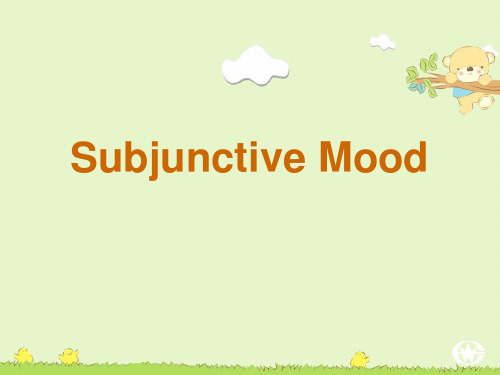
If there were no subjueasier to learn.
• A. could have been • B. would be • C. will be • D. would have been
2.were型虚拟式常用于wish, would rather, suppose, imagine等表示“希望,但愿,宁愿”的-that 分句 中,表示一种臆想的(通常是不可能发生的)情况。
与过去 相反的 假设
If+主语+had +过去分词
主语+should,
would, might, could +have done
与将来 相反的 假设
1、If+主语+动词过去式 2、If+主语+were to+ 动词原形 3、If+主语+should +动词原形
主语+should, would might, could+动词
that _b_e__s_e_n__t_(send) to hospitals at once. 3.He suggested that we_h__a_v_e___(have) a meeting at
once.
2、用在It is +形容词 + that-clause中, 主要表 示主观看法,比如:“某事是必要的、重要的、自 然而然的” 从句谓语动词用should +动词原形, should 可省。
• It’s natural that she should do so. 她这样做是很自然的。
• It’s important that we should take good care of the patient.
虚拟语气(Subjunctive Mood)
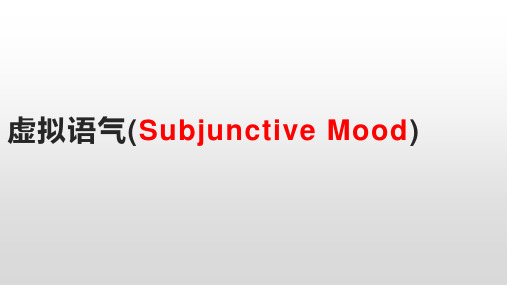
虚拟语气
5虚. 拟情况 虚拟语气
从句
后的宾语从句常用
与现在事实或将来事实相反 与过去事实相反
I’d rather he _______ (go) to the seaside with me the day before yesterday.
6.
引导的
常用虚拟语气
She looked as if nothing ___________ (happen) to her.
或
we _________________ (start) out.
you _____________(get) up.
虚拟语气
4.虚拟语气在动词
中的运用[
wish+宾语从句表示不能实现的愿望,可意为“
虚拟情况
从句
] ”
I wish (that) I ____ (be) a bird and could fly freely in the sky. I wish (that) I _______ (meet) that film star yesterday. I wish (that) he _________ (visit) me tomorrow.
put off.
If you
my advice, you
in this exam.
练习: 1. If I were you, I _w__ou_l_d_s_e_iz_e__(seize) the chance to go abroad.
2. If you hadn’t encouraged me, I _w__ou_l_d_n_o_t_h_a_v_e_b_e_e_n__ad_m__it_t_ed__(not admit) to this unversity.
虚拟语气-Subjunctive Mood

A. 与现在事实相反: 与现在事实相反:
If + 主语 + were / V-ed, 主语 + should (would, might, could) + V. E.g. --- If he were a millionaire, I would die. --- If the end of the world came now, I would feel very sad.
E.G. --- Had you invited us, we would have come to your party. --- Were I you, I would do more practice after class. --- Could she lend us a helping hand, she would do so.
Exercise: 1. It’s necessary that he _____ the book at once. A. will return B. returned C. has to return D. return 2. I desire that my boyfriend ______ 10 million. A. has B. have C. will have D. had 3. My suggestion was that we _____ there after the class. A. went B. would go C. had gone D. go 4. He didn’t go to the party, but he does wish he _____ there. A. had been B. has been C. would have been D. would be
1虚拟语气(Subjunctive Mood)
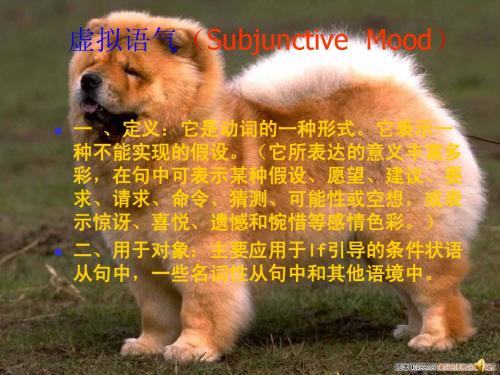
定义:它是动词的一种形式。 一 、定义:它是动词的一种形式。它表示一 种不能实现的假设。(它所表达的意义丰富多 种不能实现的假设。(它所表达的意义丰富多 。( 在句中可表示某种假设、愿望、建议、 彩,在句中可表示某种假设、愿望、建议、要 请求、命令、猜测、可能性或空想, 求、请求、命令、猜测、可能性或空想,或表 示惊讶、喜悦、遗憾和惋惜等感情色彩。) 示惊讶、喜悦、遗憾和惋惜等感情色彩。) 用于对象:主要应用于If If引导的条件状语 二、用于对象:主要应用于If引导的条件状语 从句中,一些名词性从句中和其他语境中。 从句中,一些名词性从句中和其他语境中。
headmaster, 7、If I had been your headmaster,I should have school.我要是你们的校长的话 我要是你们的校长的话, dismissed you from school.我要是你们的校长的话, 我将开除你们的学籍。 我将开除你们的学籍。 term, 8、If you had studied harder last term,you exam.如果你在上个学期用功一些 如果你在上个学期用功一些, could have passed exam.如果你在上个学期用功一些, 你就会通过考了。 你就会通过考了。 advice, wouldn’t 9、If you had taken my advice,you wouldn t have exam.如果你当时听了我的劝告的话 如果你当时听了我的劝告的话, failed in the exam.如果你当时听了我的劝告的话, 你就不会在考试中失败了。 你就不会在考试中失败了。 10、 earlier, 10、If you had got up earlier,you could have train.如果你起的早一点 如果你起的早一点, caught the train.如果你起的早一点,你就会赶得上 火车了。 火车了。 11、 snowed, 11、If it had snowed,I would have skied in the park.如果下雪的话 我就可以在公园里滑雪了。 如果下雪的话, park.如果下雪的话,我就可以在公园里滑雪了。 注意:如果说动作正在进行中,主句要用: 注意:如果说动作正在进行中,主句要用:主语 +would+have+完成进行时动词 完成进行时动词+ Eg:12 Eg:12、 +would+have+完成进行时动词+…Eg:12、If I had home, TV.如 stayed at home, would have been watching TV.如 Back 果我呆在家里的话,我会正在看电视。 果我呆在家里的话,我会正在看电视。
什么是虚拟语气的情态动词

什么是虚拟语气的情态动词?虚拟语气(Subjunctive Mood)是英语中用于表达假设、愿望、建议、命令等非真实情况的一种语气形式。
在虚拟语气中,情态动词(Modal Verbs)在某些情况下会出现特殊的形式来表示虚拟语气。
以下是一些常见的情态动词在虚拟语气中的用法:1. could:-表示能力或可能性的虚拟:He could win the game if he practiced more.(如果他多练习的话,他可能会赢得比赛。
)-表示礼貌的虚拟:Could you please pass me the salt?(你能给我递一下盐吗?)2. would:-表示愿望或假设的虚拟:I wish he would come to the party.(我希望他能来参加派对。
)-表示请求或建议的虚拟:I would suggest that you study harder for the exam.(我建议你为考试更加努力学习。
)3. might:-表示可能性的虚拟:It might rain tomorrow, so bring an umbrella.(明天可能会下雨,所以带把伞。
)4. should:-表示建议或命令的虚拟:He should apologize for his behavior.(他应该为自己的行为道歉。
)5. had better:-表示建议或命令的虚拟:You had better be on time for the meeting.(你最好准时参加会议。
)6. ought to:-表示责任或建议的虚拟:She ought to help her parents with the housework.(她应该帮助父母做家务。
)在使用情态动词时,需要注意以下几点:-情态动词一般不加s,即第三人称单数形式和其他人称形式一样。
-在虚拟语气中,情态动词后面的动词一般使用原形,例如:I wish I could go.(我希望我能去。
虚拟语气(Subjunctive Mood)

5.时态助动词 时态助动词should+have+过去分 时态助动词 + + 词,用于一切人称和数 You should have taken his advice. 6.时态助动词 时态助动词should(第一人称)和 时态助动词 (第一人称) would(第二 三人称)+动词原形 三人称)+ )+动词原形 ( If I were you, I should reconsider his
17
3.
后的that-从句中 在would rather后的 后的 从句中
1) would rather, would as soon意为“宁 愿”, that-从句动词用过去式表示不是事实。 例如: --Would you like him to paint the door green? --I’d rather (than) he painted it blue.
4
虚拟语气的形式
1、动词原形,用于一切人称和数 、动词原形, Eg. 1) God bless you! 2) If that be so, we shall go at once 2 动词过去式,用于一切人称和数,be的过去式用 动词过去式,用于一切人称和数, 的过去式用 were。 。 Eg. If I had the book, I would lend it to you. If he were here, everything would be all right.
8
虚拟语气的意义
情态动词(Modal Verbs)是说话人用来表示说 话的语气,包括叙述、命令、要求、愿望及 不可能的假设。
9
虚拟语气可分三种如下: 一、纯虚拟 (形式和意义都属虚拟。) 首先,可用条件副词分句 条件副词分句来表示一种不 条件副词分句 是真实性的假设,如: (1) If l were you, l would not do such a thing. (2) I wish l could do something for you. (3) I wish l had not made such a decision.
虚拟语气(Subjunctive Mood )

三、①虚拟语气在主语从句中的运用 (1)在句型 is important (necessary,strange, 在句型“It 在句型 , , natural)that...”中,that后面的从句中的谓语动词用: 后面的从句中的谓语动词用: 中 后面的从句中的谓语动词用 (should+)动词原形。 + 动词原形。 动词原形 It’s necessary that we should have a walk now. 我们有必要出去散散步。 我们有必要出去散散步。
(2)It is /was suggested (requested,required, , , ordered,proposed,etc.) that...句型中。 句型中。 , , 句型中 It is advised that one (should) take plenty of boiled water. 有人建议每个人都应多喝开水。 有人建议每个人都应多喝开水。 It is proposed that the plan (should) be delayed. 有人建议推迟这项计划。 有人建议推迟这项计划。
(2)用于表示主观判断、建议、命令和要求等动词 用于表示主观判断、建议、 用于表示主观判断 后的宾语从句中,常用“(should)+动词原形 表 后的宾语从句中,常用 +动词原形”表 示虚拟语气, 常省略。 示虚拟语气,should常省略。常见的动词有: 常省略 常见的动词有: demand要求,请求 ,desire渴望;要求 ,command 要求 请求 渴望 要求 要求,命令 坚决主张; 命令 ,order,require要求 命令 ,insist坚决主张 , 建议,劝告 要求, 坚决要求 ,recommend建议 劝告 ,request要求 请求;请求给予 提议,建议 建议,提出 请求 请求给予 ,suggest,propose提议 建议 提出 , , advise,urge(规劝 等。 规劝)等 , 规劝 He suggested that we (should) start off early the next day. 他建议我们第二天早点动身。 他建议我们第二天早点动身。
Subjunctive Mood

(二)时态推后型主要用于下列五种句式: 1. 在由if / unless引导的条件从句及其主句中
条件从句 与现在事实相反 与过去/过去将 来事实相反 与将来事实相反 一般过去时(be → were) 过去完成时 一般过去时 / 过去将来时(should / were to + V) 主 句 would / should / could / might + V would / should / could / might + have +V-ed would / should / could / might + V
2.在 “would, would/had rather (宁愿;巴不得), would/had sooner (宁愿), would/had (just) as soon (还是愿意/但愿)等 + 从句” 以及wish后面的宾语从句中, 表示与事实相反的虚拟语气要用did表示现在和将来的含义, 用had done表示过去的含 义。 Would you mind if I opened the door? I’d rather we had / didn’t have dinner now. I would just as soon you didn’t take those important papers with you. I wish(ed) I / he were a millionaire. I wish(ed) he hadn’t gone. I wish he would / might / were to stay with me. 3. 在以suppose / supposing / imagine 开头的祈使句或条件句中: Suppose the earth were flat. Just suppose / imagine everyone were to give up smoking. Supposing it were so? (= Supposing it were so, what would happen?) (supposing = what if) 4. 在“It is / was (high或about) time” 之后的that-从句中,用did表示“做某事的 时间早完了或早该做了” 。 It’s time you went to bed. 你该睡觉了。 5. 在as if / as though所引导的状语/表语从句中(在现代英语中也常用陈述语气): He spoke / speaks as if he were a foreigner. (同时发生) He spoke / speaks as if he had done something wrong. ( “好像以前做错了 事” —先于主句发生) He looks as if he had a lot of money.
虚拟语气(Subjunctive Mood)
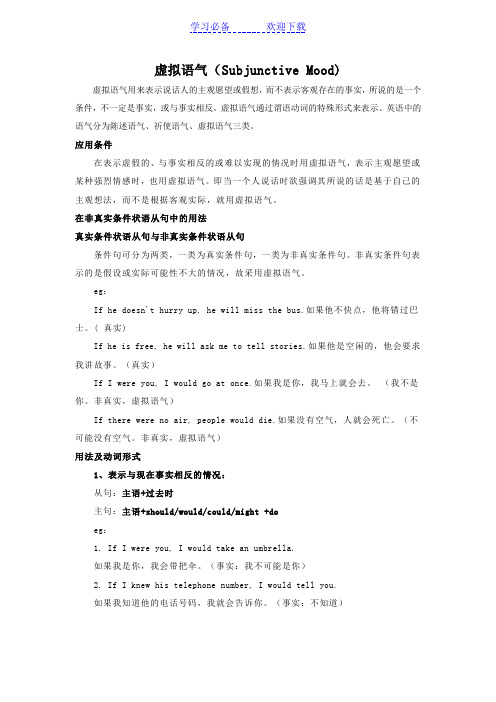
虚拟语气(Subjunctive Mood)虚拟语气用来表示说话人的主观愿望或假想,而不表示客观存在的事实,所说的是一个条件,不一定是事实,或与事实相反。
虚拟语气通过谓语动词的特殊形式来表示。
英语中的语气分为陈述语气、祈使语气、虚拟语气三类。
应用条件在表示虚假的、与事实相反的或难以实现的情况时用虚拟语气,表示主观愿望或某种强烈情感时,也用虚拟语气。
即当一个人说话时欲强调其所说的话是基于自己的主观想法,而不是根据客观实际,就用虚拟语气。
在非真实条件状语从句中的用法真实条件状语从句与非真实条件状语从句条件句可分为两类,一类为真实条件句,一类为非真实条件句。
非真实条件句表示的是假设或实际可能性不大的情况,故采用虚拟语气。
eg:If he doesn't hurry up, he will miss the bus.如果他不快点,他将错过巴士。
( 真实)If he is free, he will ask me to tell stories.如果他是空闲的,他会要求我讲故事。
(真实)If I were you, I would go at once.如果我是你,我马上就会去。
(我不是你。
非真实,虚拟语气)If there were no air, people would die.如果没有空气,人就会死亡。
(不可能没有空气。
非真实,虚拟语气)用法及动词形式1、表示与现在事实相反的情况:从句:主语+过去时主句:主语+should/would/could/might +doeg:1. If I were you, I would take an umbrella.如果我是你,我会带把伞。
(事实:我不可能是你)2. If I knew his telephone number, I would tell you.如果我知道他的电话号码,我就会告诉你。
(事实:不知道)3. If there were no air or water, there would be no living things on the earth.如果没有水和空气,地球上就不会有生物。
英语语法-虚拟语气
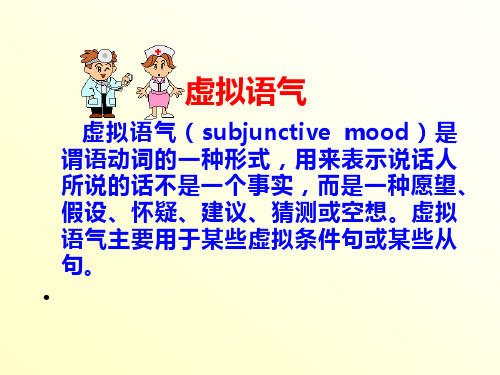
IV. clause
• 1. …suggest/propose/recommend/demand/ord er/command/desire/require/request/insist/stipulate/ adivised/decide that … (should) do… • 2. …suggestion/proposal/recommendation/de mand/order/command/desire/request/requirement/i nsistence/stipulation/advice/decision that …(should) do… • 3. It is/was advisable/desirable/suggested/requested/ordered/p roposed/decided that …(should) do
在It is /was +形容词后的that从句中 常用“should + 不定式”表示建议、惊奇等。每式英 语中省略should。这类常见的形容词有: advisable, appropriate, essential, necessary, possible, preferable, proper等。 It’s advisable that the Sport Meets be put off owing to the bad weather. 在使用if的代用语及其省略的句子中,后接过去式 常见代用语有:provided (that), supposing/suppose, in case of, otherwise等。 Supposing the ship were to sink, do you think there would be enough life jackets for all the passengers?
subjunctive mood用法

Subjunctive Mood用法什么是Subjunctive Mood?Subjunctive Mood,中文翻译为“虚拟语气”,是英语中一种特殊的语气形式。
与陈述语气和祈使语气不同,虚拟语气用来表达假设、愿望、建议、命令等非现实或非事实的情况。
它常常出现在条件句、愿望从句和建议从句中。
Subjunctive Mood的用法1. 条件句中的虚拟语气在条件句中,如果主句和从句所描述的情况是不真实或不可能发生的,我们就需要使用虚拟语气。
a. 表示与现在相反的情况:如果条件从句描述的是与现在相反的情况,我们使用”were”来代替”was”作为动词be的虚拟形式。
例如:•If I were you, I would study harder.(如果我是你,我会更加努力学习。
)•If she were here, she would help us.(如果她在这里,她会帮助我们。
)b. 表示与过去相反的情况:如果条件从句描述的是与过去相反的情况,我们使用过去完成时态来表示虚拟语气。
例如:•If I had known the answer, I would have told you.(如果我知道答案,我会告诉你的。
)•If he had studied harder, he would have passed the exam.(如果他学得更努力,他就会通过考试。
)c. 表示与将来相反的情况:如果条件从句描述的是与将来相反的情况,我们使用”were to”或”should”结构来表示虚拟语气。
例如:•If it were to rain tomorrow, we would stay at home.(如果明天下雨,我们会呆在家里。
)•If she should arrive late, please wait for her.(如果她迟到了,请等她。
)2. 愿望从句中的虚拟语气在愿望从句中,我们使用虚拟语气来表达对现实或过去情况的希望、渴望或遗憾。
什么是虚拟语气
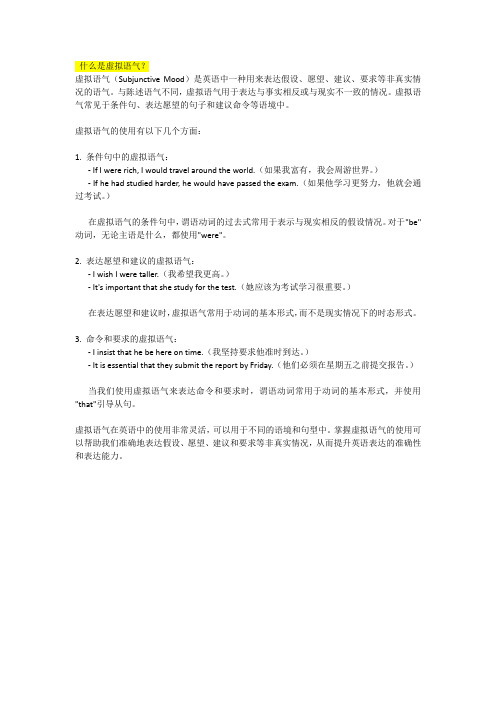
什么是虚拟语气?虚拟语气(Subjunctive Mood)是英语中一种用来表达假设、愿望、建议、要求等非真实情况的语气。
与陈述语气不同,虚拟语气用于表达与事实相反或与现实不一致的情况。
虚拟语气常见于条件句、表达愿望的句子和建议命令等语境中。
虚拟语气的使用有以下几个方面:1. 条件句中的虚拟语气:- If I were rich, I would travel around the world.(如果我富有,我会周游世界。
)- If he had studied harder, he would have passed the exam.(如果他学习更努力,他就会通过考试。
)在虚拟语气的条件句中,谓语动词的过去式常用于表示与现实相反的假设情况。
对于"be"动词,无论主语是什么,都使用"were"。
2. 表达愿望和建议的虚拟语气:- I wish I were taller.(我希望我更高。
)- It's important that she study for the test.(她应该为考试学习很重要。
)在表达愿望和建议时,虚拟语气常用于动词的基本形式,而不是现实情况下的时态形式。
3. 命令和要求的虚拟语气:- I insist that he be here on time.(我坚持要求他准时到达。
)- It is essential that they submit the report by Friday.(他们必须在星期五之前提交报告。
)当我们使用虚拟语气来表达命令和要求时,谓语动词常用于动词的基本形式,并使用"that"引导从句。
虚拟语气在英语中的使用非常灵活,可以用于不同的语境和句型中。
掌握虚拟语气的使用可以帮助我们准确地表达假设、愿望、建议和要求等非真实情况,从而提升英语表达的准确性和表达能力。
subjunctive mood用法

subjunctive mood用法Subjunctive Mood用法什么是Subjunctive Mood?Subjunctive Mood(虚拟语气),是一种用来表示怀疑、愿望、建议、命令等非实际情况的语气。
它通常用在主句的动词之后,以表示与事实相反或与现实不符的情况。
Subjunctive Mood的用法以下是Subjunctive Mood的一些常见用法:•表达建议–表达祝愿或建议,常用动词包括recommend, suggest, propose等。
•I suggest that he write a letter of apology.(我建议他写一封道歉信。
)•表达要求或命令–表达要求或命令,常用动词包括order, demand, insist 等。
•The professor demanded that the students be on time for the exam.(教授要求学生们考试要准时到达。
)•表达可能性或条件–表达可能性或条件,常用动词包括if, whether, suppose 等。
•If I were you, I would take this opportunity.(如果我是你,我会抓住这个机会。
)•表达虚拟情况–表达虚拟情况,常用动词包括wish, if only, as if等。
•I wish I knew the answer.(但我其实不知道这个答案。
)•表达建议主张–表达建议主张,常用动词包括insist, request, propose 等。
•It is important that he attend the meeting.(他参加会议很重要。
)Subjunctive Mood的例句以下是一些例句来帮助理解Subjunctive Mood的用法:•She suggested that he buy a new car.•His teacher insisted that he finish the assignment by tomorrow.•If I were you, I would travel the world.•I wish I could speak fluent French.•It is recommended that they arrive at least 30 minutes before the event starts.小结Subjunctive Mood是一种用来表示非实际情况的语气。
subjunctive mood
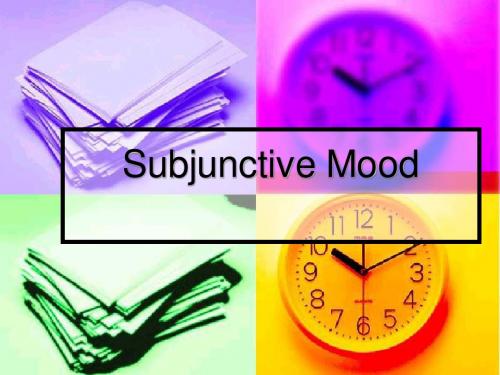
It is desired that we (should) get everything ready by tonight. It was ordered that the medicines be sent here by plane. C) 同位语从句及表语从句中的虚拟语气: Their resolution is that extra-curriculum extraactivities are made part of their school life. B 改为be 或should be. 改为be Many a delegate was in favor of his proposal that a special committee _______ to investigate the incident. A. were set up B. was set up C. be set up D. set up 在表示建议,命令,主张,目的,愿望等名 词后面的表语从句和同位语从句中谓语动词 要求用虚拟语气.其形式为:"谓语动词原 形或should 形或should + 动词原形".
B) 与过去事实相反的假设
If we hadn't made adequate preparations, the conference wouldn't have been so successful. successful. The flood might have caused great damage to the people if we hadn't built so many reservoirs. reservoirs.
3) 省略if 的__ there be any trouble with the boiler, the automatic controlling unit would cut off the fuel oil supply. A. Would B. Must C. Could D. Should Had he worked harder, he ________ the exams. A. must have got through B. would get through C. would have got through D. could get through
- 1、下载文档前请自行甄别文档内容的完整性,平台不提供额外的编辑、内容补充、找答案等附加服务。
- 2、"仅部分预览"的文档,不可在线预览部分如存在完整性等问题,可反馈申请退款(可完整预览的文档不适用该条件!)。
- 3、如文档侵犯您的权益,请联系客服反馈,我们会尽快为您处理(人工客服工作时间:9:00-18:30)。
1) If it snowed today, I would stay at home. 2) If it had snowed yesterday, I would have stayed at home. snowed 3) If it were to snow tomorrow, I should snow would stay at home. Note: If I had the book, I will lend it to you.
It is + adj. / n.+ that + (should) be 型 It is necessary that some immediate effort (should) be made. Note: It is amazing (odd, strange, surprising, wrong, astonishing, inconceivable, a pity, a shame, a thousand pities, to be regretted), I am surprised (sorry) , I regret…, that 从句中用should,不可省, 意为“竟然”。
5) ___ (be) I in good health, I ___ (go) with you tomorrow.
→ if 的省略——倒装:假设条件状语从句中谓语动词部 分是were + to do, had done或是should + do时
可把if省略,把were, had, should提前, 引起倒装。
Note: 比较下面两句 She would have come to see you but she was ill that day. She would have come to see you but that she was ill that day. (but that 只能表示虚拟条件) But that it snowed heavily, they could have arrived there earlier. = But for the heavy snow, …
Subjunctive Mood
一. 虚拟语气的两种基本表达方式 1. be- 型虚拟式 (be-subjunctive) I You go/be/be sent … He 2. were- 型虚拟式 (were-subjunctive) I You were/were going/were sent He
The demand is that manuscripts (should) be written on one side only. 5.在important, necessary 等后的从句中 imperative, natural, urgent, essential, appropriate, desirable, insistent, obligatory, probable, vital, advisable, better, keen, preferable, possible, incredible, funny, pitiful, deplorable可 悲的,imperative, resolved, eager, anxious, concerned, ridiculous, unthinkable , no wonder, a pity, not right
三. 虚拟语气在某些从句中的运用 1. wish 1) I wish she were here. 2) I wish you would go with us tomorrow. 3) I wish she had taken my advice. 2. if only, would that 1) If only I could speak several foreign language! 2) Would that I were young again! (would that = I/we would = I wish)
8) A man who stopped working would amount to nothing. 9) You should never join the club, it would do you no good. 10) Ordinarily, he would have flown into rage. Note: would + 动词原形 + but (except) + 现在陈 述句(陈述语气) (表示同现在事实相反的假设)
1) Had I not seen it with my own eyes , I would not have believed it.
= If I had not seen it …
2) Were it not to rain tomorrow , we would have a picnic. = If it were not to rain …
4. 无“条件”的虚拟语气句子 with, without, but for, or, but, otherwise, even, in case of, what if (如果…将如何) 1) She wasn’t feeling very well. Otherwise she wouldn’t have left the meeting so early. 2) With better equipment, we could have done itclause)和表语从句 (predicative clause)中
(should) do 型 They requested that he (should) sing a song. Note: When asked why he declined our invitation, he suggested that he was not on good terms with the director.
If I had the book, I should lend it to you.
Exercises
1) If they ____ (forget) to bring a compass with them, they ___ (get) lost in the woods. 2) If I ___ (have) time then, I ___ (attend) the meeting. 3) I didn’t see your sister at the meeting. If she ___ (come), she ___ (meet) my brother. 4) If it ___ (rain) tomorrow, we ___ (not go out).
3) She said she would have come to the party. Only she had an urgent matter to attend to. 4) Failing this, what would you do? = If you failed this, … 5) To talk with him, you would know he is a frank man. 6) Seen from the hill, the wheat field would look like a golden sea. 7) On being shown this book, no one would believe that it was written by a ten-year-old girl.
It is amazing that he should have learnt so much in such a short time. 可省略,成为虚拟式的感叹句: That he should miss such a golden opportunity! 6. It is (high, about) time, “were型” It is high time that we were off. Note: 可改为“should do” (should不能省略); 可用“it is time for sb. to do sth.” 代 替
3.在宾语从句中(object clause) suggest, order, demand, propose, command, request, desire, insist, require, decide, promise, arrange, ask, move, consent, determine, recommend, advise, intend, beg, resolve, argue, maintain, deserve值得提及, prefer, decree 裁决, vote, urge, instruct, advocate, persuade, dictate, agree, pray, legislate立法, sentence, object, expect, direct, appoint, provide规定,specify, persist, permit, petition请愿,stipulate
二. 虚拟语气在条件句(conditional sentences)中的运用 1. 虚拟条件句 (sentence of unreal condition) 从句 (if) 主句 现在: were/did, would/should/might/could (以下省) do 过去: had done, would have done were to 未来: should do, would do were
would have + 过去分词 + but (except) + 过去时 陈述句(陈述语气) (表示同过去事实相反的假设) Exercises: 1. A: Why didn’t Henry come? B: He ____except she didn’t have time. A. would have come B. will come C. would come D. be coming 2. She would gain weight but she ____enough. A. wouldn't eat B. didn’t eat C. doesn’t eat D. hadn’t eaten
